'I’ll Tell You All My Shit, Then': The Origin Story of Chris Chalk, According to Chris Chalk
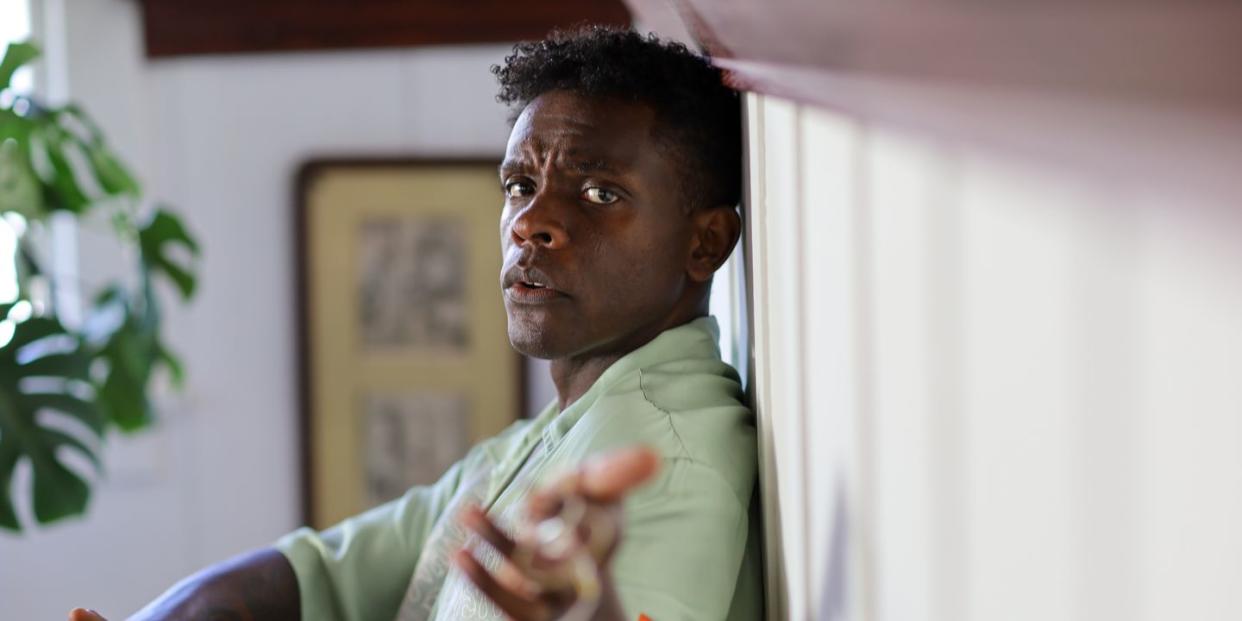
After about a half hour on the phone with Chris Chalk—where you talk a little about his featured role in HBO's Perry Mason reboot, learn about Chalk's aptitude for sewing Japanese-style pants, and he finds the jug of water that he thought he lost before the call—you ask him for his origin story.
In other words? How Chris Chalk became… well, Chris Chalk.
“A Chris Chalk origin story?” asks Chris Chalk. He pauses. “Look, Chris Chalk was born in Asheville, North Carolina, single mom. I think they were married, and I really don't know. I told this to my agent the other day and she didn't believe me: I didn't know what divorce meant until I was in college.”
With minimal interruptions, sidebars—or a break for air, really—it takes approximately 21 minutes and three seconds for Chris Chalk to recite The Origin Story of Chris Chalk in its glorious, heartbreaking, joyous entirety. Some highlights: When he lost to Tia Davis for student government president in the fifth grade. High school, where Chalk encountered quite a few racist schools while touring a play called Endangered Species, audiences spitting on him and the rest of the cast. Sometime in college, when he was supposed to perform in a play in Monte Carlo, but had to call it off because a guy lost his finger. Later in adulthood, a day when he took a picture of himself naked, went yuck, and lost 50 pounds in the next three months.
“That... is the end... of the longest saga ever,” Chris Chalk will say at the end of The Origin Story of Chris Chalk. Really, though, these interviews aren't really a less is more thing.
“I'll tell you all my shit then.” Which Chalk absolutely does. That was just the trailer.
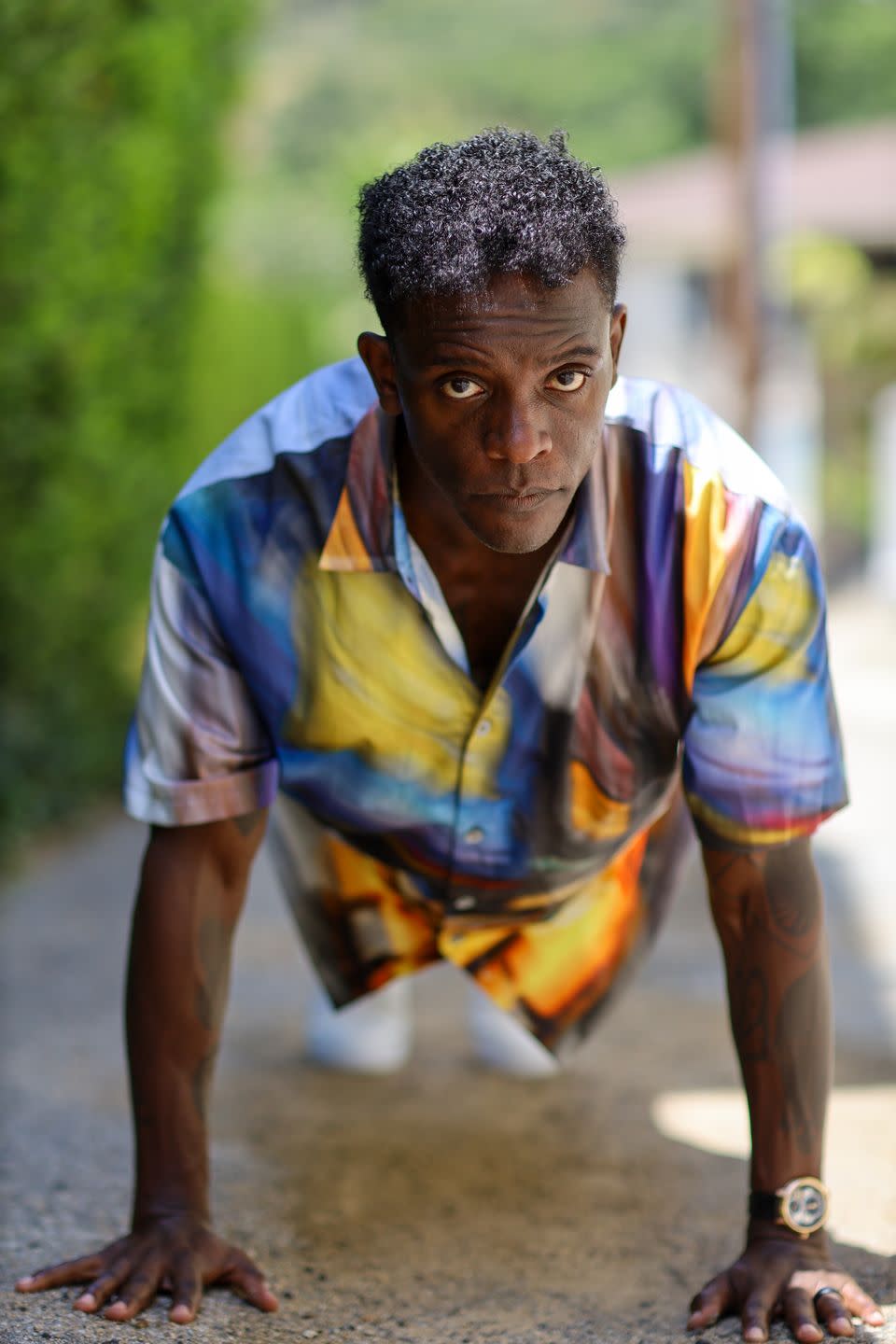
Christopher Eugene Chalk, of Asheville, North Carolina, if you can't tell by now, may very well be the most earnest man you'll ever meet. Brutally honest, hilarious—brutally honest while being hilarious—remarkably open in a situation known for its tendency to be a feedback loop of question, answer, question, non-answer. Chalk is a longtime theater actor, and a rising television star. Currently featured Perry Mason, where he plays Paul Drake, a Black police officer in a very white (and very racist) 1930s-era Los Angeles Police Department. Chalk has already worked with Denzel Washington, Ava Duvernay, and Steve McQueen, but his turn as Drake—a role that may very well be the only one of its kind on TV—is the one that could land him an Emmy someday.
As The Origin Story of Chris Chalk makes very clear, Chalk has been working for an incredibly long time to land a breakout role like Paul Drake. He's also been working for an incredibly long time on figuring out what The Origin Story of Chris Chalk actually is. Or means. Things are going pretty well for him (see: big part in an HBO drama), so his wife told him: "You might as well go to therapy, you know?" While life is good, both of them figured. Although, as nearly everyone who's been in therapy knows: It's hard to find a good therapist. Chalk found that out the hard way.
"Man, that first shot was awful, bro," Chalk says. "This guy, I won't use his name even though I do want him to smash his face into the wall... He just took everything I said to him and was like, 'You have a problem!' I was like, 'What? I don't have a problem.' His lack of professionalism and my vulnerability in that situation led me down a two-and-a-half-week path of like, Oh, shit, am I broken?! Meanwhile! No, I'm not. But now I've got to check, and now my feelings are hurt. It's easy to go down those spirals of joy and despair."
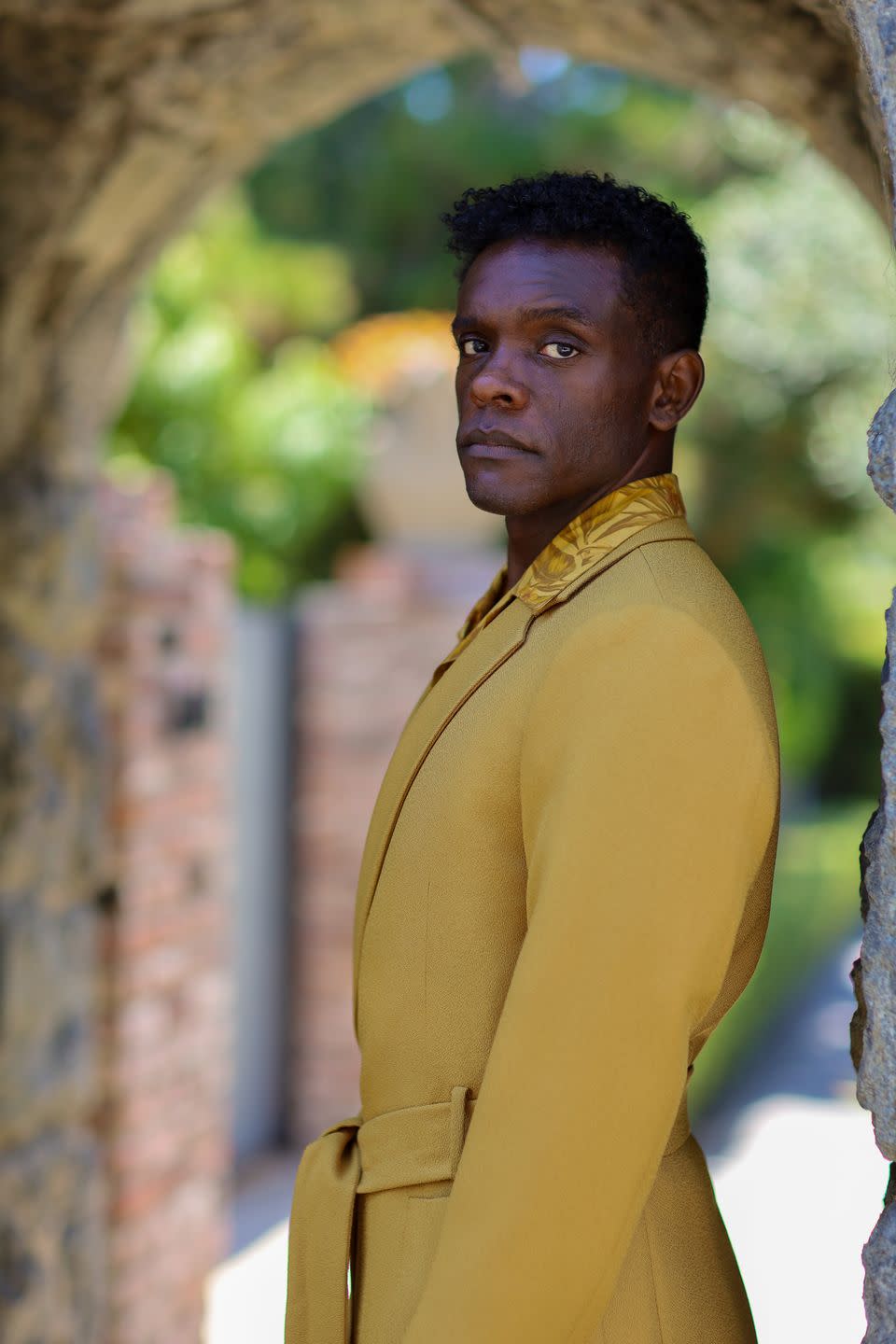
Thankfully, Chalk found a keeper after that. Two-word review? "Just bliss." A damn good space for the study of origin stories. And to know Chris Chalk's origin story is to know how he can play Paul Drake with sniping humor, a survive-at-all-costs instinct, and a warm heart. We already covered a little bit of the childhood chapter: Single mother, absent father, starts raising his nephew when he's 11 years old. In grade school, basketball, student government, and acting takes up all his time. Really, life is just this: Pick up his nephew, go to basketball practice, go rehearse, go home. Chalk wasn't afforded the opportunity to think. That's why he says that's why he didn't really form opinions until high school, when touring Endangered Species became such a big part of his life, the play running all the way from his sophomore to senior year.
"We took words that were already written, like some Langston Hughes, some Nikki Giovanni, and then we did some original pieces and we turned it into this piece," Chalk says. "Then the piece was so successful that we then turned it into a competition piece that we could take to schools. We were doing the show everywhere, like racist schools. People were spitting on us. We definitely didn't finish the show at one of those schools, because they were just booing and spitting on us."
Of the basketball, government, and acting trifecta, acting wins: Chalk goes to UNC Greensboro to get a BFA in acting. Later in college, he takes some time off to tour a play overseas, seeing France, Spain, Belgium, Luxembourg and Switzerland for six months. The tour is where he started to really get a hang of the acting thing. After he graduates, Chalk moves to New York a little after 9/11, goes through a bout of depression, along with the rest of the city, then gets a gig as reader for at Labyrinth Theater Companies, then Telsey and Company. He absorbs tricks—and more importantly, kindness—from the talented folks at both places.
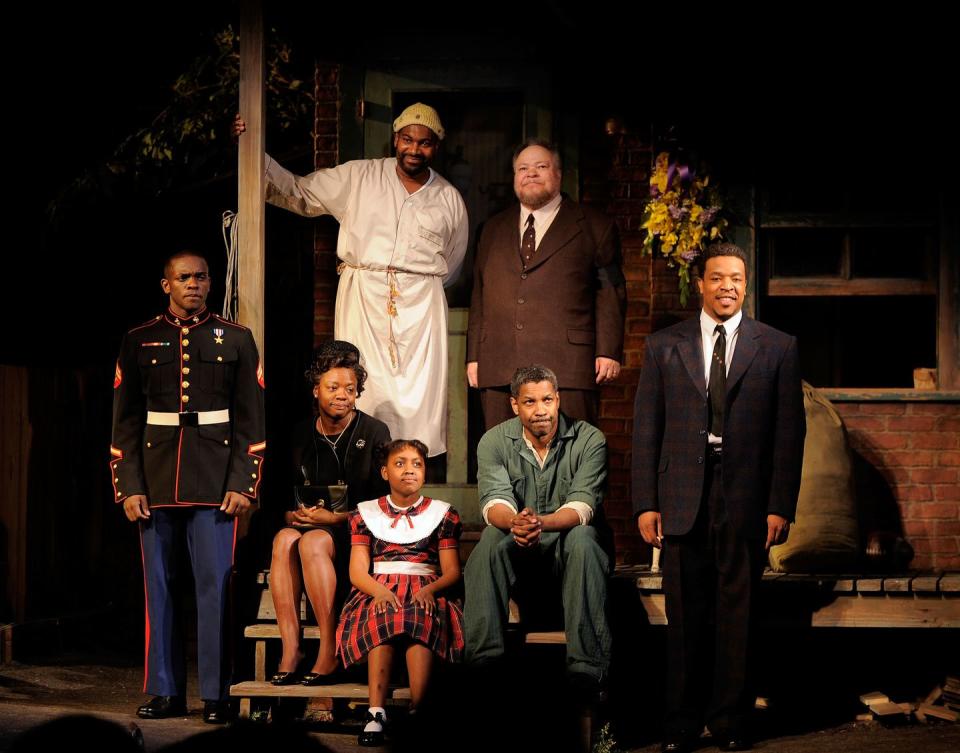
"It was these little kindnesses that I attached to," Chalk says. "So, people often ask, 'Did you ever think about giving up?' I'm like, 'No, because these things kept happening to let me know I was on the track,' and it's never been an idea of giving up."
At different points during his early career in New York, Chalk works at a hotel, the weight loss episode happens ("I was wearing my sadness"), and he starts auditioning for theater roles. That leads to parts in some off-Broadway plays, and eventually lands a big-time role: Cory in the Broadway adaptation of Fences, opposite Denzel Washington. If there was any doubt about where Chalk was headed then, it was shushed on opening night: He nabbed Drama Desk Award nomination and a Theatre World Award for his turn in the August Wilson classic.
"I did that show and that show was a hit, and I thought, 'That's my career. I'm done. I got this. Bong bong, I won,'" Chalk says. "I didn't work for six or seven months after that show closed."
Sharing a stage with Denzel does that to you. So, Chalk started taking on television roles, a little bigger each time: Homeland, The Newsroom, Law & Order, Gotham, adult Yusef Salaam in Ava Duvernay's portrait of the Central Park Five, When They See Us. The Newsroom brings him out of his New York, never-not-burnt out bubble, over to Los Angeles, where he sees the laid-back wonders of California, he goes: Oh, man. This is a better life. I like this better. Moves there. This is roughly when The Origin Story of Chris Chalk ends and Perry Mason begins. So yeah. This has all been a long time coming.
When Chalk first heard HBO was rebooting the mid-century cable TV court procedural, he didn't think much about it—just a bunch of white dudes talking, he thought. Nothing to do with him. (Drake was played by a white actor, William Hopper, in the original show.) Then, he saw the team HBO put together. And the script. A Black police officer navigating the racial makeup of a painfully regressive Los Angeles. Oh, no, this is going to be real. Chalk auditions, HBO likes what they see, Perry Mason director Tim Van Patten invites him over to talk about the part.
"The first 20 minutes was business, and it was me asking like, 'I'm a Black man and I want to do Black man shit,'" Chalk says. "I've been a part of things where you never go home with the guy, because he's a prop for white growth. I'm not mad about it or anything, but that's just been the role of Black males in shows like these in the past."
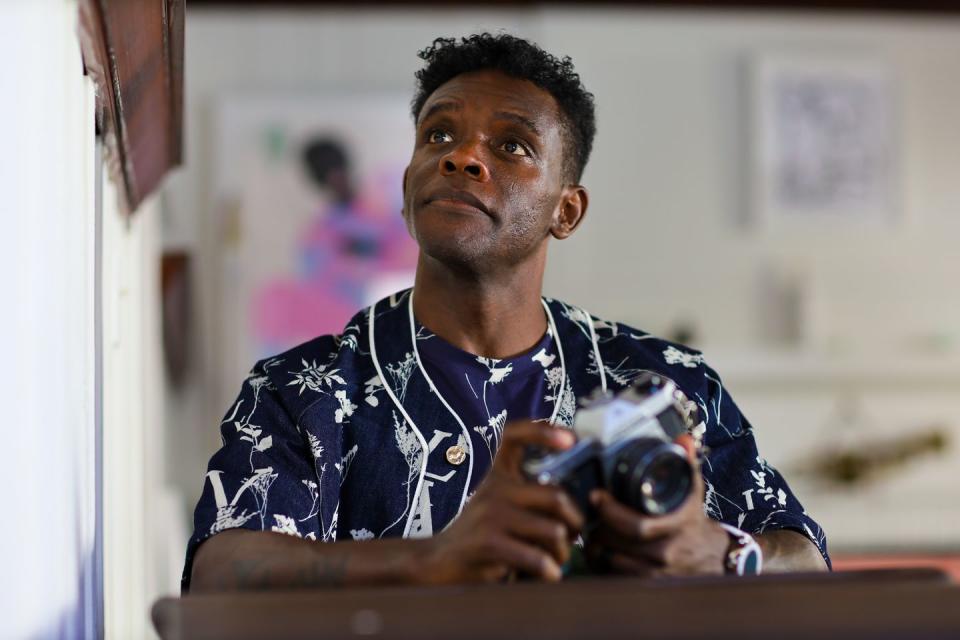
When Chalk got the call offering him the gig, which came around the same time as a loss in his family, he cried. Drake's words were words he wanted to honor. In Perry Mason, Chalk portrays Drake as a man of law and order, flipping veils like a zoetrope, just trying to survive and keep his wife, who is pregnant, safe. As Drake, Chalk hums with energy every time he's on screen—clearly the smartest man in every room he's in, but knows it's too dangerous to show it. But when he's asked to bury evidence that could legitimately save the life of an innocent woman, Drake has to ask if going rogue from the LAPD is worth putting himself and his family at risk.
"I hate that I'm about to use this reference, but there's a Naruto reference where he says if he can't save his best friend, how can he become Hokage?" Chalk says, in what's the first and last time that Naruto will ever be mentioned in the same sentence as Perry Mason. "Paul is like, How can I be a good person if I'm not being a good person?"
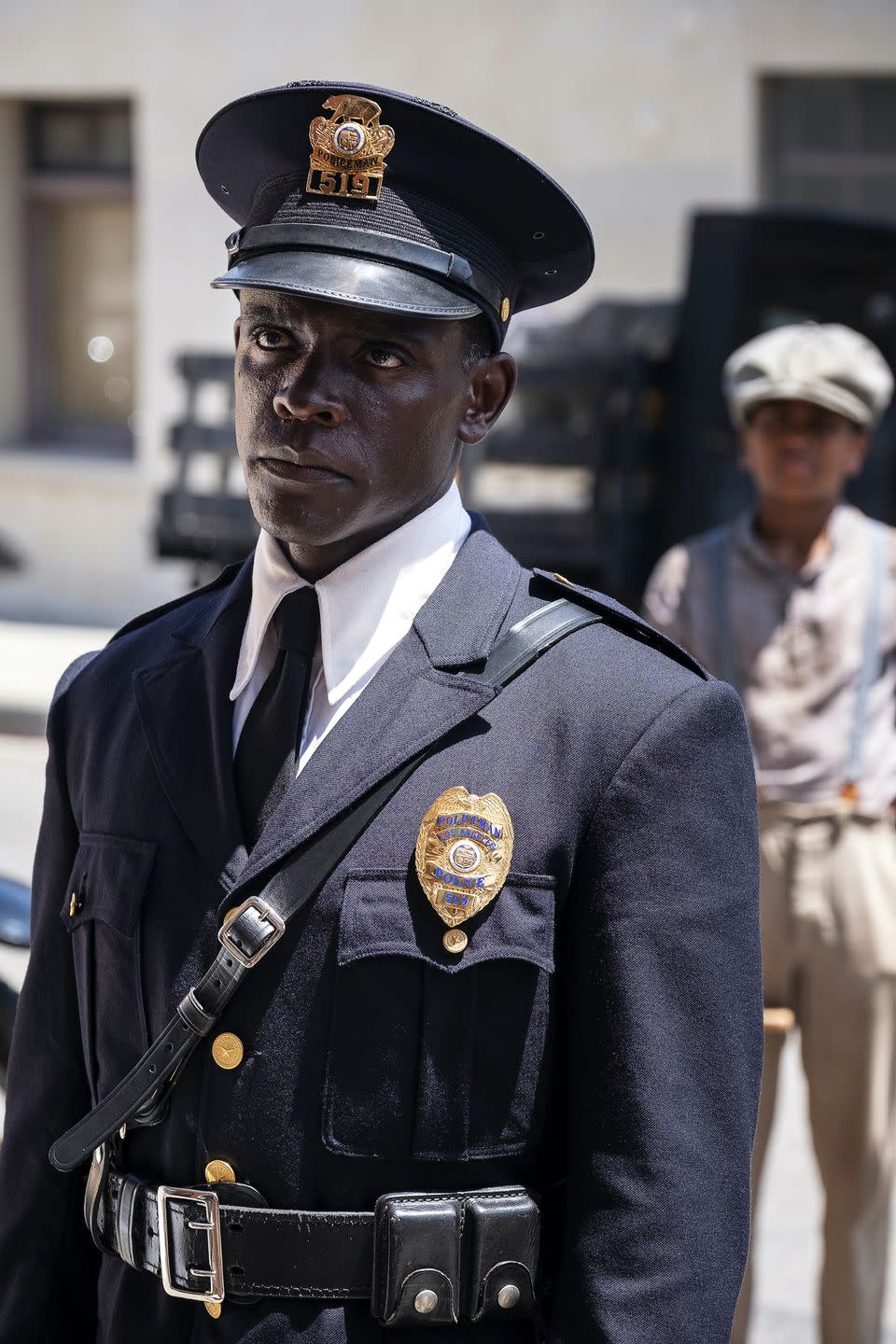
If you haven't wrapped up Perry Mason, this is the time to turn around. Good? All right. After Emily Dodson's case ends in a mistrial (woo, yay Perry), the show launches into full Season Two setup mode. Mason, Della Street, and Drake form something of a super-team at the episode's end. Going forward, it looks like Mason and Street will run their own law firm, with Drake—having turned in his badge for good—sticking around for all the private-investigator action. In the finale, Drake makes fun of Mason a little, leading you to think Season Two of Perry Mason will be a Perry-Paul buddy trip. Far from it.
"I even wonder how much [Drake] actually trusts Perry now," he says. "He's still a white male. He still called him the N-word, and I think Paul didn't forget that. He's just like, Okay. Well, he only did it once. As opposed to these people who have done it a million times."
That's just Drake's presumptive life at Mason and Associates. You think the LAPD took kindly to him shoving his badge and that bribe money back at that officer?
"Once [Drake] turns that badge in, he's living the most dangerous life possible for an African American, because now he's a former, he betrayed the police. They know his name," Chalk says. "They know you and they know you actively are coming against them, so I think in the future Paul faces a lot more emotional and spiritual freedom, but probably physically he's going to be in a lot more danger."
After all the Perry talk, after The Origin Story of Chris Chalk, Chalk talks a little bit about his future—he's prepping himself to take a shot as playing James Baldwin in the inevitable biopic. "That's what I want. I want full people. I want the Paul Drakes of the world, these people who are dealing with very real things," Chalk says. But even after hearing all 21 minutes and three seconds of The Origin Story of Chris Chalk, you realize even that was more likely The Abridged Origin Story of Chris Chalk. 40 years of a life, growing up with a single mother, post-9/11 New York, Denzel, all of it, distilled into palatable interview form. You ask, if somewhere in The Origin Story of Chris Chalk, there is a moment that made Chris Chalk, Chris Chalk.
He has two.
Moment number one: Seven years old, on the porch of a dirt-cheap, one-bedroom house on a hill.
"Sitting out front, it was my birthday. No one told me 'happy birthday,' and my dad didn't come. I had a mini-party inside, but no one realized I was there. I thought about that all day for years... But it didn't make me sad. It did make me sad, but it also made me realize that I was okay being alone. I also was like, 'But I don't want to be like this forever.' That was the seed of: 'I'm going to be more than this. I want more attention than this. I want to be embraced and heard more than this.'"
Moment number two: Sophomore year of college. There's a voice and movement coach who would have kids in the program talk through their personal trauma. Which is dangerous. But Chalk says he'll always thank her for it.
"It was the first time I'd ever said my sexual abuse out loud... I realized that I had been performing kindness from the moment I was born until that moment that that teacher said, 'Hey, man, everybody doesn't have to like you.' Then I went, 'Oh! Then I don't have to carry this anymore.' ... It was the first time I said anything out loud bad that had happened to me, and that's when I went, 'Oh, I need to start talking about this shit so that I can heal through this, so that I can continue to become better.' But also, the moment I started going, 'Oh, shit. I'm a person, and my opinion matters, and the people that don't get down with me, I'll figure out what to do with that.'"
These things, really, are just Polaroids. Well, more like if you took a pair of scissors to the very edge of that Polaroid, so that you can still see a hand, or even just a finger. We're long, long past Perry Mason at this point. You tell Chalk a little bit about your origin story, too. He listens, and laughs, and relates as best he can, like you did during his origin story. Chalk's PR person, who's listening in on the call, is probably silently screaming for all of the stories to end. It eventually does. One last disclaimer from Chalk, before we leave.
“Let's not depress everybody! They can't hear us laughing, nope. They're like, Oh my... How is this guy living?"
Probably failed him on that one. So, if this wasn't clear: We were laughing our asses off, almost the whole time.
You Might Also Like

